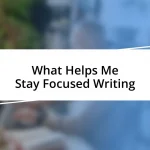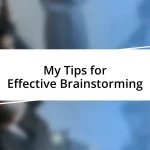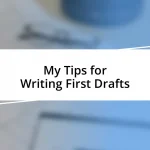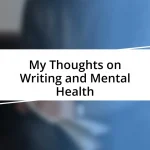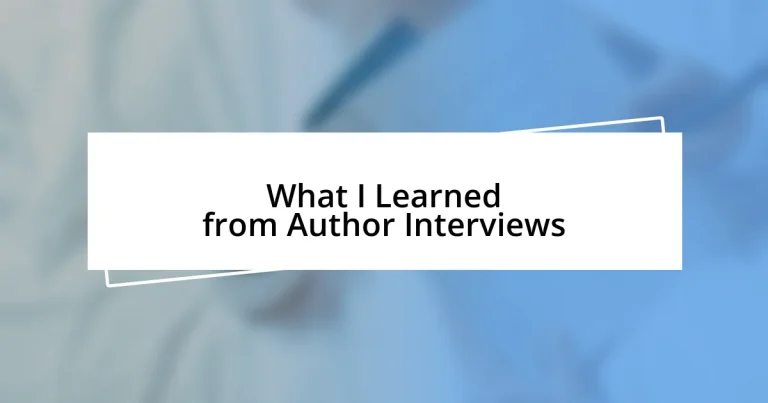Key takeaways:
- Author interviews offer unique insights into the creative process, revealing how personal experiences influence storytelling.
- Effective preparation involves researching the author, crafting open-ended questions, and fostering a comfortable atmosphere for conversation.
- Flexibility in interview style and the use of follow-up questions can lead to deeper discussions and richer exchanges of ideas.
- Understanding cultural contexts can enhance conversations, allowing authors to share more meaningful insights about their work and its significance.
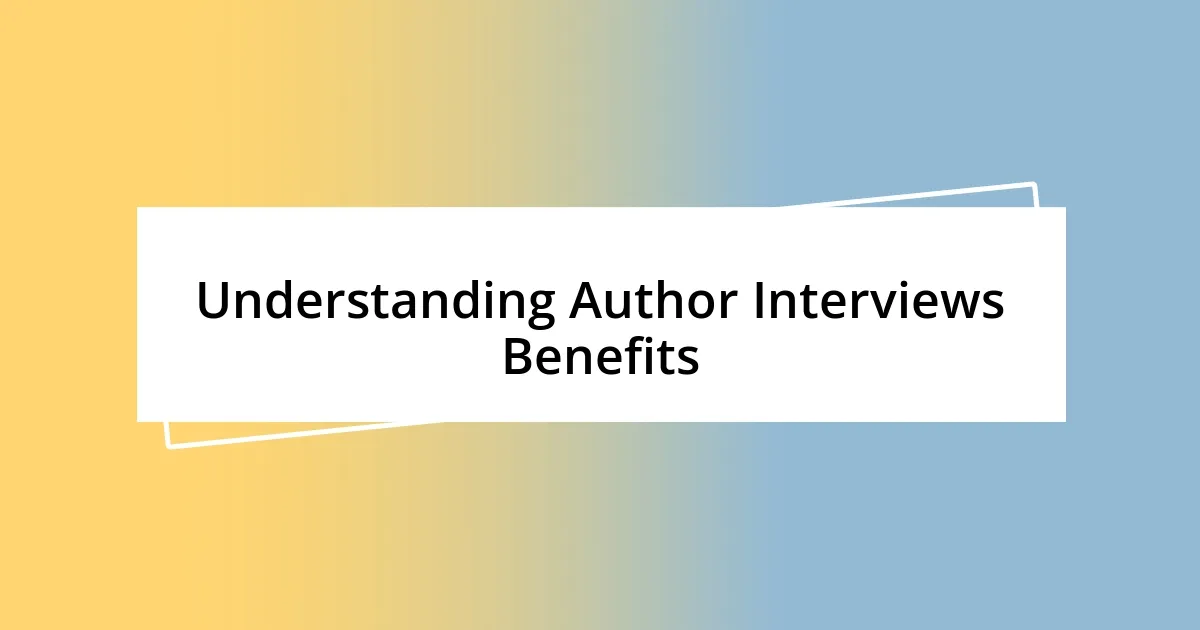
Understanding Author Interviews Benefits
One of the most significant benefits of author interviews is the unique perspective they provide on the creative process. I’ll never forget a conversation I had with a debut novelist who shared how her struggles with self-doubt fueled her writing. Hearing firsthand how vulnerability can shape storytelling made me realize just how connected readers can feel to an author’s journey. Have you ever thought about how much depth lies beneath the surface of a book?
Engaging with authors allows us to uncover the motivations behind their characters and themes. I recall a time when I interviewed a seasoned writer who explained the inspiration he drew from his childhood experiences. This insight not only enriched my appreciation for his work but also sparked reflections on my own life. Isn’t it fascinating how personal experiences can resonate through fiction, making stories feel universal yet intimate?
Additionally, author interviews often reveal behind-the-scenes tidbits that only the creators know. I remember chatting with an author who shared a whimsical anecdote about a character’s name that almost never made it to the final draft. It reminded me that every detail in a book can hold a story of its own. Don’t you feel that these little glimpses transform a reading experience into a shared journey between the reader and the author?
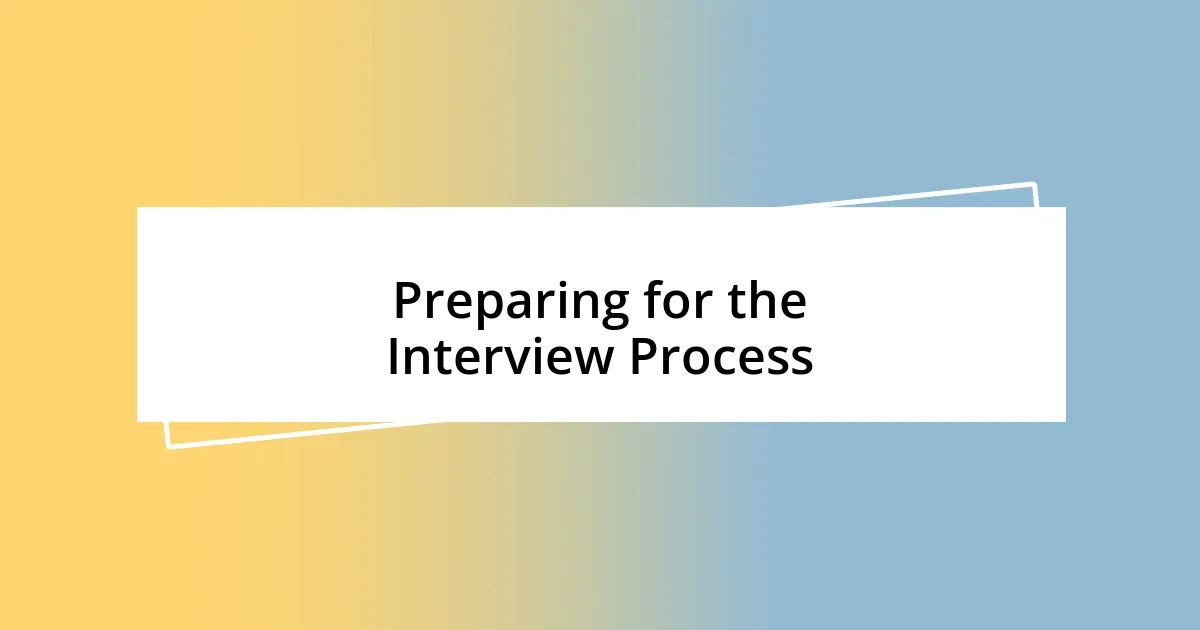
Preparing for the Interview Process
Preparing for an author interview is all about laying the groundwork. I always find that a little preparation can go a long way in making the conversation meaningful. When I interviewed a poet, I spent time reading their work, which opened up a dialogue that felt genuinely connected and informed. It wasn’t just about asking questions; it was about engaging in a shared exploration of their artistry.
Here’s a checklist that I find useful when preparing for these interviews:
- Research the Author: Understand their previous works and any unique themes.
- Formulate Open-Ended Questions: Design questions that encourage storytelling rather than yes/no answers.
- Create a Comfortable Atmosphere: Find a setting that feels welcoming and conducive to open conversation.
- Be Flexible: Be ready to deviate from your planned questions if the conversation takes an enlightening turn.
- Practice Active Listening: Pay attention to the author’s responses; this can spark deeper discussion.
I’ve learned that it’s not just about sticking to a script. Just like when I interviewed a graphic novelist whose art reflects personal struggles, the more I listened and engaged, the richer the conversation became. It transformed our interaction from a simple question and answer to a genuine exchange of ideas and experiences.
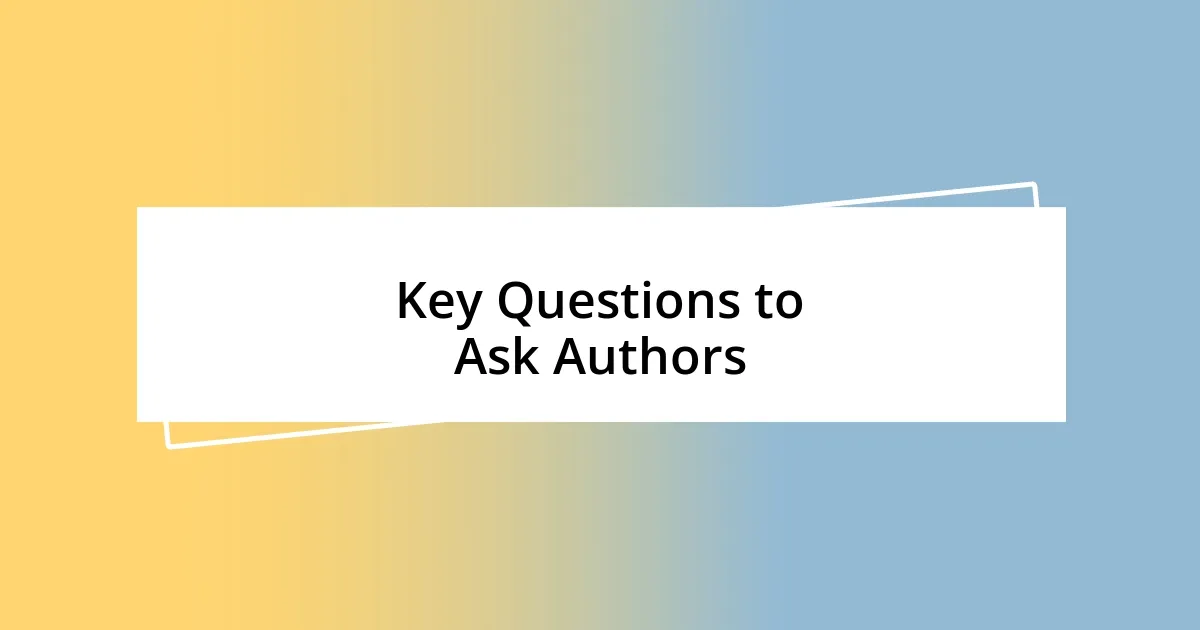
Key Questions to Ask Authors
When interviewing authors, I find that asking about their writing routine can yield fascinating insights. I once spoke with an author who described her daily ritual of writing at dawn, fueled by the quietude of the morning. This practice not only highlighted her dedication but also revealed how the time of day shaped her creativity. Have you considered how an author’s environment might influence their work?
Another pivotal question to include is about the challenges they faced while crafting their story. During an interview with a first-time novelist, he opened up about the obstacles he encountered during his editing process. Hearing about his perseverance in the face of self-doubt was not only inspiring but also reminded me of my encounters with similar hurdles in my own creative projects. Can you relate to the idea of pushing through uncertainty to achieve something meaningful?
Lastly, it’s impactful to ask authors about their target audience and how they envision readers engaging with their work. When I had a conversation with a well-known fantasy writer, he shared that he writes with his younger self in mind—encouraging readers to explore their imaginations. This perspective shifted my view on storytelling and reminded me that authors often seek to connect with deep-seated emotions in their readers. How do you feel when a book resonates with you on such a personal level?
| Key Question | Purpose |
|---|---|
| What is your writing routine? | To discover the author’s inspiration and dedication. |
| What challenges did you face while writing? | To understand the difficulties overcome in the creative process. |
| Who is your target audience? | To gain insight into the author’s intention and reader connection. |
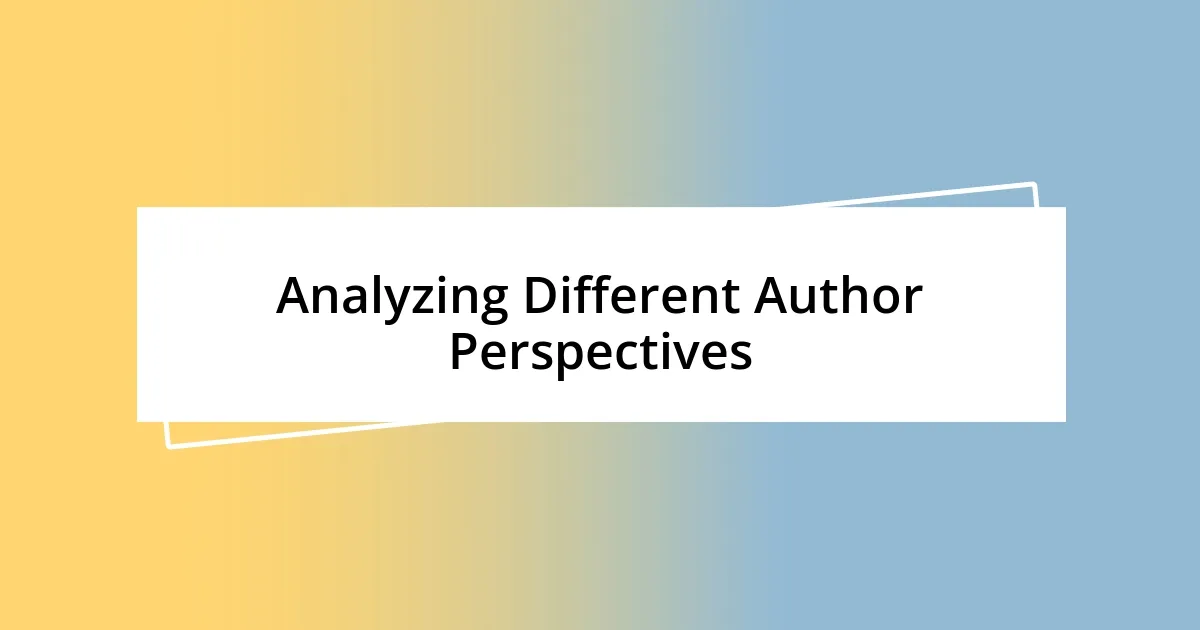
Analyzing Different Author Perspectives
When I dive into an author interview, I’m often struck by how diverse their perspectives can be. For instance, I spoke with a memoirist who reflected on the scars left behind by her childhood—she described writing as a means of healing. It made me realize that every story is wrapped in personal experience and emotional layers. Don’t you ever wonder how much of an author’s life seeps into their work?
Then there’s the unique way authors approach their narratives. I once chatted with a speculative fiction writer who embraced world-building as a form of escapism. He mentioned that creating alternate realities was essential for his mental well-being, which got me thinking about how storytelling serves as a refuge for many. Have you ever considered where an author finds solace in their creations?
Finally, I find that listening to an author’s philosophy on writing itself can reveal deeper motivations. In an interview with a playwright, she passionately spoke about the importance of dialogue as a reflection of societal issues. Her words resonated with me because they captured the idea that storytelling can spark change. Isn’t it fascinating how art can mirror and influence the world around us?
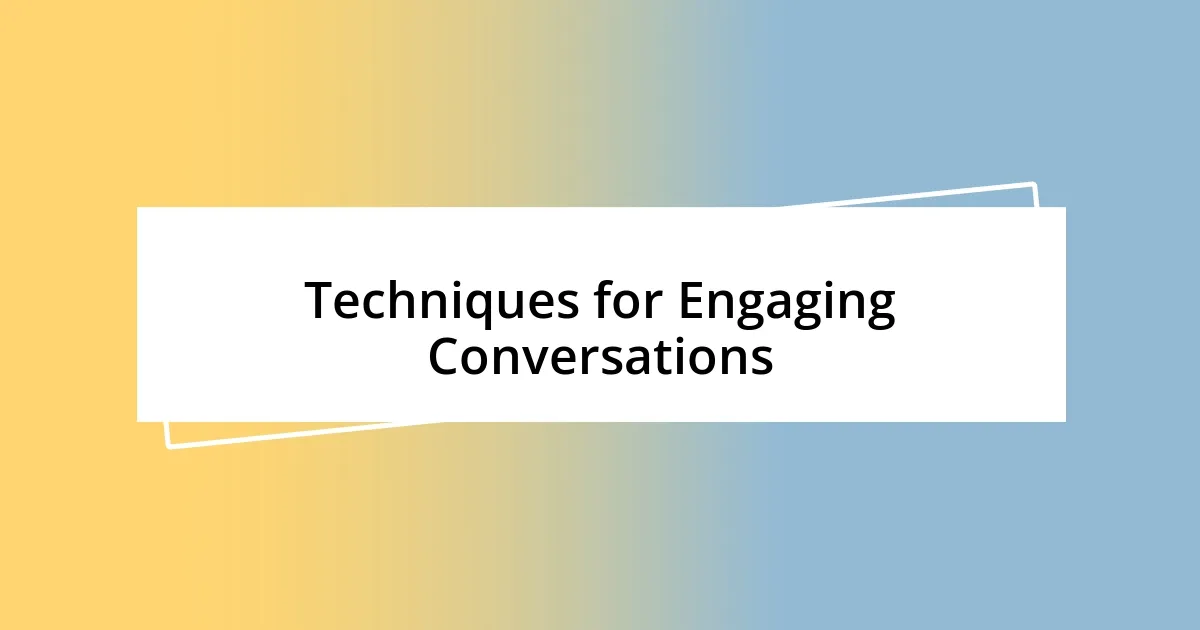
Techniques for Engaging Conversations
One of my go-to techniques for nurturing engaging conversations is the power of follow-up questions. After an author shares an intriguing point, I always encourage them to elaborate further. For instance, I once interviewed a poet who mentioned her inspiration drawn from nature. I simply asked, “Can you describe a specific moment in nature that sparked a poem?” This prompted a vivid recollection of a sunrise that inspired one of her pieces, making our dialogue much richer. Don’t you think digging deeper can lead to unexpected gems in conversation?
Another effective method I employ is actively listening and mirroring the author’s emotions. During a discussion with a thriller writer, I could sense the intensity in his voice when he talked about setting the stakes for his characters. I nodded and responded with, “That sounds like a real rollercoaster ride for your readers!” This acknowledgment not only reinforced his feelings but also prompted him to share more details about his creative process. Have you ever noticed how reflecting someone’s emotions can make them feel more connected in a conversation?
Creating a comfortable atmosphere is equally essential. I remember an interview with an author who was initially reserved. To ease the tension, I shared a light-hearted moment from my own writing experience, like the time I accidentally deleted a chapter. As I laughed at my blunder, she relaxed and reciprocated with a funny mishap from her early writing days. It transformed the interview into a friendly exchange rather than a rigid Q&A. How do you foster a sense of comfort when engaging with someone new?
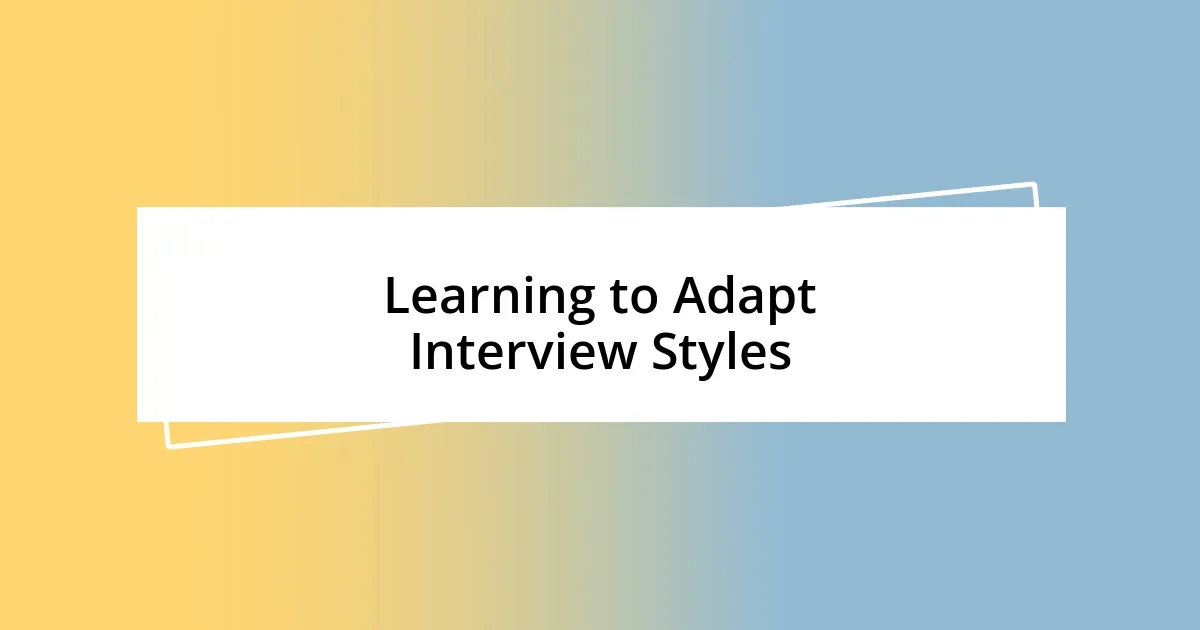
Learning to Adapt Interview Styles
Adapting my interview style has been a game changer for me. I remember one interview with a historical fiction author who seemed a bit more guarded at first. Realizing this, I shifted my approach and started with open-ended questions that allowed her to share her thoughts freely. Suddenly, we went from surface-level discussions to her passionately recounting the research process that fueled her latest book. Have you ever adjusted your style on the fly to connect with someone better?
There’s also a lesson in recognizing when to be direct versus when to approach a more nuanced conversation. During an interview with a seasoned romance author, I was tempted to jump straight into her thoughts on character development. Instead, I began with a light-hearted question about the quirks of her characters. This pivot not only lightened the mood but also led to an unexpected discussion about how those quirks mirror her own life experiences. Isn’t it interesting how a small shift in questioning can unlock deeper layers of insight?
Lastly, I’ve discovered that cultural context can profoundly influence an author’s expression. In a discussion with an Indigenous author, I initially approached the interview with a Western narrative framework. However, I quickly recognized the need to adapt my style by learning about the rich cultural significance of storytelling in her community. Once I embraced this perspective, she opened up about the intergenerational stories passed down in her family, enriching our conversation immensely. How often do we find ourselves learning something impactful by simply being flexible in our approach?







